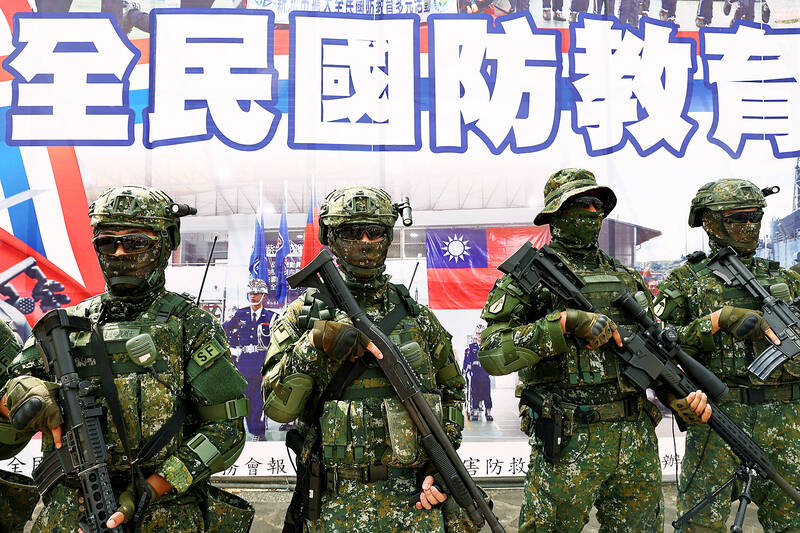The Ministry of National Defense (MND) is planning amendments to the General Mobilization Act (全民防衛動員準備法) to augment the nation’s mobilization preparedness.
In its draft amendments, the ministry is planning to include separate mobilization categories for the media, finance and information and communications sectors.
There would be preparation phases for workforce allotment, finance, transportation, health and sanitation, technology, and the military, the draft amendments say.

Photo: Ann Wang, Reuters
Regarding the information and communications sector, authorities would have a mandate to reorganize personnel working in publication, broadcasting, Internet platforms or other media service providers to handle the documentation and investigation of news and false information, the ministry said.
Preparations for the finance sector would include efforts to stabilize domestic finances and foreign-exchange rates, the draft amendments say.
The draft would include pre-mobilization preparations and actual mobilization, and the act’s name would be changed to the “available mobilization act.”
Mobilization preparations encompass peacetime preparations, while mobilization is defined as when the president orders a general or partial mobilization — in accordance with the Constitution — in the event that war breaks out, war is imminent or due to a disaster emergency.
Once the president declares mobilization, all readiness programs would transition to actual mobilization status, the draft amendments say.
The Executive Yuan would establish a reaction center to lead local government reaction centers. Local governments, if ordered to, would have priority access to all media and communications devices to report on the status of the war, emergency contingencies and other related information, the drafts says.
Once amended, the act would give the central government the power to allocate resources among all levels of government.
People caught driving up prices or hoarding goods without a legitimate reason would face a prison sentence of one to seven years and a fine of NT$5 million (US$164,042), the draft amendments say.
Individuals drafted by the government who fail to appear at the designated area at the appointed time would be sentenced to up to seven years in prison and have to pay a fine of NT$7 million.
Those disseminating false information on mobilization or drafting that could harm others during mobilization would face up to three years of prison and and a fine of NT$1 million.
The draft amendments say that those who disseminate false information via broadcast, electronic communications or the Internet could have their sentence doubled.

AIR SUPPORT: The Ministry of National Defense thanked the US for the delivery, adding that it was an indicator of the White House’s commitment to the Taiwan Relations Act Deputy Minister of National Defense Po Horng-huei (柏鴻輝) and Representative to the US Alexander Yui on Friday attended a delivery ceremony for the first of Taiwan’s long-awaited 66 F-16C/D Block 70 jets at a Lockheed Martin Corp factory in Greenville, South Carolina. “We are so proud to be the global home of the F-16 and to support Taiwan’s air defense capabilities,” US Representative William Timmons wrote on X, alongside a photograph of Taiwanese and US officials at the event. The F-16C/D Block 70 jets Taiwan ordered have the same capabilities as aircraft that had been upgraded to F-16Vs. The batch of Lockheed Martin

GRIDLOCK: The National Fire Agency’s Special Search and Rescue team is on standby to travel to the countries to help out with the rescue effort A powerful earthquake rocked Myanmar and neighboring Thailand yesterday, killing at least three people in Bangkok and burying dozens when a high-rise building under construction collapsed. Footage shared on social media from Myanmar’s second-largest city showed widespread destruction, raising fears that many were trapped under the rubble or killed. The magnitude 7.7 earthquake, with an epicenter near Mandalay in Myanmar, struck at midday and was followed by a strong magnitude 6.4 aftershock. The extent of death, injury and destruction — especially in Myanmar, which is embroiled in a civil war and where information is tightly controlled at the best of times —

Taiwan was ranked the fourth-safest country in the world with a score of 82.9, trailing only Andorra, the United Arab Emirates and Qatar in Numbeo’s Safety Index by Country report. Taiwan’s score improved by 0.1 points compared with last year’s mid-year report, which had Taiwan fourth with a score of 82.8. However, both scores were lower than in last year’s first review, when Taiwan scored 83.3, and are a long way from when Taiwan was named the second-safest country in the world in 2021, scoring 84.8. Taiwan ranked higher than Singapore in ninth with a score of 77.4 and Japan in 10th with

SECURITY RISK: If there is a conflict between China and Taiwan, ‘there would likely be significant consequences to global economic and security interests,’ it said China remains the top military and cyber threat to the US and continues to make progress on capabilities to seize Taiwan, a report by US intelligence agencies said on Tuesday. The report provides an overview of the “collective insights” of top US intelligence agencies about the security threats to the US posed by foreign nations and criminal organizations. In its Annual Threat Assessment, the agencies divided threats facing the US into two broad categories, “nonstate transnational criminals and terrorists” and “major state actors,” with China, Russia, Iran and North Korea named. Of those countries, “China presents the most comprehensive and robust military threat